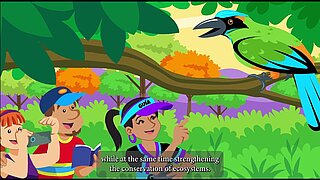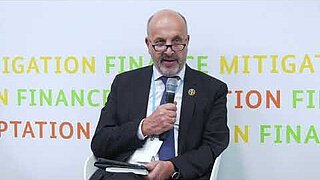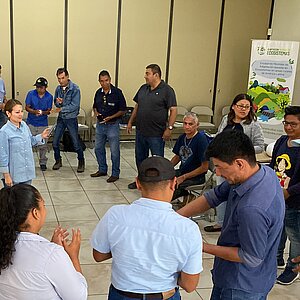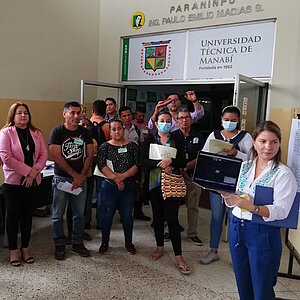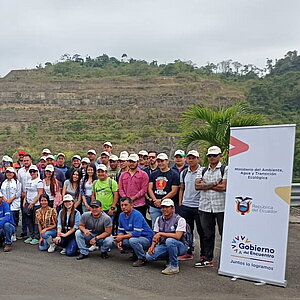Scaling-up Ecosystem-based adaptation (EbA) measures in rural Latin America
Latin American countries are severely affected by impacts of climate change and associated extreme weather events. The project increases the resilience of vulnerable communities and ecosystems in rural areas of the partner countries. To this end, it develops and implements proven, innovative and cost-effective EbA approaches in different ecosystems. It also strengthens the capacity of a wide range of actors, including national and local government and civil society organisations, the private sector, service providers and rural communities. It also embeds EbA practices into the revised NDCs, sectoral plans and national adaptation plans to better achieve national adaptation goals. The project ensures long-term impact in partner countries through, among other things, the (further) development of innovative financial instruments and products, improved governance and knowledge exchange.
- Countries
- Argentina, Colombia, Costa Rica, Ecuador, El Salvador, Guatemala
- IKI funding
- 20,000,000.00 €
- Included preparation phase
- 555,700.00 €
- Duration
- 11/2020 till 12/2025
- Status
- open
- Implementing organisation
- Deutsche Gesellschaft für Internationale Zusammenarbeit (GIZ) GmbH
- Political Partner
-
- Diverse climate change relevant institutions in the respective partner countries/Diverse klimarelevante Institutionen in den entsprechenden Partnerländern
- Ministry of Environment - Ecuador
- Ministry of Environment and Energy (MINAE) - Costa Rica
- Ministry of Environment and Natural Resources (MARN) - Guatemala
- Implementing Partner
-
- International Union for Conservation of Nature and Natural Resources (IUCN) - Switzerland
- Tropical Agricultural Research and Higher Education Center (CATIE) - Costa Rica
- Online
State of implementation/results
- Ecuador:
- Ten ecosystem-based adaptation measures have been implemented on 367 hectares to strengthen climate resilience, benefiting around 3,400 people (ebalac.com/…).
- Launch of the cocoa field school to strengthen cacao agroforestry system and optimize production.
- Preparing and responding to the impacts of the El Niño phenomenon: Correction of slopes with Bamboo cane with the International Bamboo and Rattan Organization, the Regional Government of Chone and Academia.
- Manabí municipalities advance in Ecosystem-based Adaptation measures and strengthen their governance with a climate change focus.
- Agricultural Fair in Manabí provides space for knowledge exchange on climate change adaptation (ebalac.com/…).
- Women and community organizations in Manabí receive training in financial management to improve their resilience to climate change (ebalac.com/… ).
- EbA LAC facilitated planning processes with municipal development councils and strengthened the participation of indigenous authorities of San José Poaquil and the Association of Indigenous Representatives of San Miguel Chicaj.
- Workshops were held to strengthen governance and strategic planning for the inclusion of Ecosystem-based Adaptation approaches with the Departmental Environmental Commission of Baja Verapaz, Chimaltenango and Quiché (www.facebook.com/…;id=100083396797999).
- Key watershed stakeholders from Quiché and Chimaltenango were engaged in multi-stakeholder planning processes to develop action plans to improve water security by integrating water resource management and ecosystem thinking.
- EbA LAC identified in cooperation with the Ministry of Environment Gender´s unit joint actions on gender and climate change plan to be implemented.
- Multi-stakeholder planning process with key local decision makers are being facilitated by EbA LAC to develop integrated landscape plans and budget plans to scale up horizontally innovative EbA measures.
- The programme has created and piloted decision support tools for upscaling and mainstreaming EbA measures from a local governance perspective. To promote scaling up of EbA approaches across the country, tools and lessons learned will be disseminated through the National Biocorridors Programme.
- EbA LAC supports the SBD (development banking sector) to increase and tailor adaptation finance to small and medium enterprises, paving the path for them to contribute to mid- and long -term climate adaptation solutions and biodiversity conservation.
- 150 leaders in agricultural extension services as well as key representatives from national and subnational institutions in Costa Rica, Ecuador and Guatemala participated in the Training of Trainers course on EbA.
- “Adaptation is clAbE” exchange on climate finance for adaptation and biodiversity conservation with UNDP Biofin and Carlos Manuel Rodríguez, CEO of the GEF.
- Regional knowledge and experience exchange on up-scaling ecosystem-based adaptation with representatives from Costa Rica, Guatemala, Ecuador, México, Bolivia and Santa Lucía.
Latest Update:
09/2024
Project relations
Legend:
The link has been copied to the clipboard




